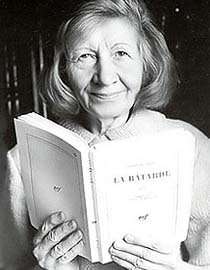Violette Leduc
| Violette Leduc | |
|---|---|
 Violette Leduc | |
| Born |
7 April 1907 Arras, Pas-de-Calais, France |
| Died |
28 May 1972 (aged 65) Faucon, Vaucluse, France |
Violette Leduc (7 April 1907 – 28 May 1972) was a French author.
Biography
She was born in Arras, Pas de Calais, France, the illegitimate daughter of a servant girl, Berthe. In Valenciennes, Violette spent most of her childhood suffering from poor self-esteem, exacerbated by her mother's hostility and excessive protectiveness. She developed tender friendships with her grandmother Fideline and her maternal aunt Laure.
Her formal education began in 1913, but was interrupted by World War I. After the war, she went to a boarding school, the Collège de Douai, where she experienced lesbian affairs with a classmate and a music instructor who was fired over the incident.[1]
In 1926 Leduc moved to Paris and enrolled in the Lycée Racine. That same year, she failed her baccalaureate exam and began working as a press cuttings clerk and secretary at Plon publishers later becoming a writer of news pieces about their publications.[2]
In 1942 she met Maurice Sachs and Simone de Beauvoir, who encouraged her to write. Her first novel, L'Asphyxie (In the Prison of Her Skin), was published by Albert Camus for Éditions Gallimard and earned her praise from Jean-Paul Sartre, Jean Cocteau and Jean Genet.
In 1955 Leduc was forced to remove part of her novel Ravages because of sexually explicit passages describing lesbianism. The censored part was eventually published as a separate novella, Thérèse and Isabelle, in 1966. Another novel, Le Taxi, caused controversy because of its depiction of incest between a brother and sister. Critic Edith J. Benkov compared this novel with the work of Marguerite Duras and Nathalie Sarraute.[3]
Leduc's best-known book, the memoir La Bâtarde, was published in 1964. It nearly won the Prix Goncourt and quickly became a bestseller. She went on to write eight more books, including La Folie en tête (Mad in Pursuit), the second part of her literary autobiography.
In 1968 Radley Metzger made a film of Leduc's novel Thérèse and Isabelle. The film was a commercial feature about adolescent lesbian love, starring Essy Persson and Anna Gael.
Leduc developed breast cancer and died at the age of 65 after two operations. She was living at Faucon, Vaucluse, at the time of her death.[4]
Violette is a 2013 French biographical drama film about Leduc, written and directed by Martin Provost.
List of works
| Library resources about Violette Leduc |
| By Violette Leduc |
|---|
- L'Asphyxie, 1946.
- L'affamée, 1948.
- Ravages, 1955.
- La vieille fille et le mort, 1958.
- Trésors à prendre, suivi de Les Boutons dorés, 1960.
- La Bâtarde, 1964.
- La Femme au petit renard, 1965.
- Thérèse et Isabelle, 1966.
- La Folie en tête, 1970.
- Le Taxi, 1971. English translation: The Taxi. Helen Weaver (translation). Hart-Davis MacGibbon. 1973. ISBN 9780246105851. OCLC 561312438.
- La Chasse à l'amour, 1973.
- Therese and Isabelle (Translated), The Feminist Press 2015.
References
- ↑ Stockinger, Jacob (4 February 2006). "Leduc, Violette". glbtq: An Encyclopedia of Gay, Lesbian, Bisexual, Transgender, and Queer Culture. Retrieved 5 August 2007.
- ↑ Leduc Violette (1964). La Batarde. Dalkey Archive Press. p. 142 onwards. ISBN 978-1564782892.
- ↑ "Leduc, Violette", in Encyclopedia of Erotic Literature, edited by Gaétan Brulotte and John Phillips. Routledge, 2006 ISBN 978-1-57958-441-2 (pgs. 790-792).
- ↑ Violette Leduc, French Novelist, New York Times, 30 May 1972, pg. 40.
- General
- Aldrich, Robert; Wotherspoon, Garry, eds. (2002). Who’s Who in Gay and Lesbian History from Antiquity to World War II. Routledge; London. ISBN 0-415-15983-0.
- Flanner, Janet (1977). Paris Journal : 1965 - 1971 Vol. 2 (pp. 10-13). Harvest (Harcourt Brace Jovanovich). ISBN 0-15-670951-1.